云计算研究现状文献综述及外文文献
云计算研究现状综述

云计算研究现状综述云计算研究现状综述近年来,云计算作为一项创新的技术被广泛应用于各个领域,成为推动信息技术发展的重要驱动力。
本文将综述目前云计算研究的现状,概述其应用及发展趋势。
一、云计算的定义及基本概念云计算是一种通过互联网提供计算资源和服务的模式,它将数据和应用从本地计算机转移到远端的服务器进行处理和存储。
云计算提供了按需、可伸缩、易扩展和弹性的计算资源,为用户提供了更高效、灵活和经济的计算服务。
二、云计算的基本架构云计算的基本架构包括三个层次:基础设施层、平台层和应用层。
基础设施层提供基本的计算、存储和网络资源,平台层为开发者提供开发工具和应用程序接口,应用层提供用户可直接使用的应用服务。
不同层次之间通过网络连接,构成了云计算的整体架构。
三、云计算的研究重点及应用领域1. 云计算的性能优化:为了提高云计算的性能和效率,研究者们致力于优化云计算中的各个环节,如资源调度、任务分配和存储管理等。
2. 云安全与隐私保护:随着云计算的迅猛发展,云安全和隐私保护成为了研究的热点。
如何保护用户数据的安全性和隐私性是当前研究的重点之一。
3. 云计算与人工智能的结合:人工智能的快速发展为云计算带来了新的机遇和挑战。
研究者们探索将人工智能与云计算相结合,提供更智能的云服务。
4. 云计算在行业应用中的应用:云计算在各个行业中得到了广泛应用,如医疗、金融、教育等。
通过云计算,可以实现跨地域协作、共享资源等优势,提高行业的效率和竞争力。
四、云计算的发展趋势1. 边缘云计算的兴起:边缘云计算是一种将计算和存储功能推向网络边缘的新兴模式,其能够提供更低延迟、更高带宽的计算资源。
随着物联网的发展,边缘云计算将成为未来的发展方向。
2. 量子计算与云计算的结合:量子计算作为新兴的计算模式具有巨大的潜力和挑战。
研究者们将云计算与量子计算相结合,以期实现更高效、更安全的计算模式。
3. 云计算的可持续发展:随着云计算规模的不断扩大,其能源消耗和碳排放也成为研究的热点。
快速云云计算国内外研究现状综述

引言概述:云计算是当今科技领域的热门话题之一,其在提高计算效率、降低成本、实现可扩展性等方面具有巨大的潜力。
随着云计算技术的日趋成熟和广泛应用,对于快速云计算的研究也越来越受到国内外学者的关注。
本文旨在综述快速云云计算国内外的研究现状,重点阐述其概念、关键技术、应用场景以及挑战与前景等方面。
正文内容:一、快速云计算的概念1.1云计算的基本概念1.2快速云计算的定义及特点1.3快速云计算与传统云计算的区别二、快速云计算的关键技术2.1基础设施的快速响应能力2.2高性能计算与存储技术2.3分布式计算与并行处理2.4网络和传输协议优化2.5数据安全和隐私保护技术三、快速云计算的应用场景3.1科学计算与仿真3.2大规模数据分析与挖掘3.3与机器学习3.4视频图像处理与分析3.5云游戏与云娱乐四、快速云计算的挑战与前景4.1性能优化与资源管理4.2数据安全与隐私保护4.3网络带宽与延迟问题4.4云计算标准与规范4.5快速云计算的未来发展五、国内外快速云计算的研究现状5.1国内快速云计算的研究现状5.2国外快速云计算的研究现状5.3国际合作与经验借鉴总结:云计算作为一种革命性的计算模式,拥有巨大的发展潜力,在快速云计算的研究领域,国内外学者积极探索,取得了显著的进展。
本文从云计算的概念和特点入手,详细介绍了快速云计算的关键技术、应用场景以及面临的挑战与前景。
通过对国内外快速云计算研究的综述,我们可以看到,国内外学者在该领域的研究成果丰硕,未来的发展前景十分广阔。
仍然存在着性能优化、资源管理、数据安全等方面的问题需要解决。
因此,需要通过加强国际合作与经验借鉴的方式,共同推动快速云计算的进一步发展。
引言概述:云计算已成为当前信息技术领域的热门话题,它通过将计算资源和服务交付给用户,提供了高效、灵活和可扩展的计算能力。
本文拟对国内外关于快速云云计算的研究现状进行综述,旨在梳理该领域的最新进展和趋势。
正文内容:一、快速云云计算的定义和特点1.快速云云计算的核心概念2.快速云云计算的特点和优势3.快速云云计算与传统云计算的比较二、快速云云计算的关键技术1.快速云云计算的基本架构和组成2.快速云云计算的虚拟化技术3.快速云云计算的分布式存储和计算技术4.快速云云计算的网络通信和安全技术5.快速云云计算的调度和资源管理技术三、国内外快速云云计算的研究进展1.国内快速云云计算的研究现状a.快速云云计算在国内的应用领域b.国内快速云云计算的发展趋势和挑战2.国外快速云云计算的研究现状a.国外快速云云计算的主要研究机构和团队b.国外快速云云计算的研究重点和创新点四、快速云云计算的应用领域和案例分析1.快速云云计算在大数据分析和处理领域的应用2.快速云云计算在和机器学习领域的应用3.快速云云计算在边缘计算和物联网领域的应用4.快速云云计算在生物医学和基因组学领域的应用5.快速云云计算在金融和电子商务领域的应用五、快速云云计算的发展趋势和挑战1.快速云云计算的发展趋势a.快速云云计算与5G技术的结合b.快速云云计算与边缘计算的融合c.快速云云计算与的协同发展2.快速云云计算面临的挑战和问题a.快速云云计算的安全和隐私问题b.快速云云计算的性能和可靠性问题c.快速云云计算的成本和能耗问题总结:本文对快速云云计算的国内外研究现状进行了综述,通过对快速云云计算的定义和特点进行了介绍,详细阐述了快速云云计算的关键技术和研究进展,并分析了快速云云计算的应用领域和发展趋势。
云计算研究进展综述

云计算研究进展综述一、本文概述随着信息技术的飞速发展和数字化转型的深入推进,云计算作为一种重要的信息技术服务模式,正逐渐改变着我们的生活和工作方式。
云计算以其弹性可扩展、按需付费、资源共享等特性,为各行各业提供了强大的计算能力和数据存储服务,推动了全球信息化进程的加速。
然而,随着云计算技术的广泛应用,也暴露出了一些问题,如安全性、隐私保护、性能优化等,这些问题成为了制约云计算技术进一步发展的重要因素。
本文旨在对云计算领域的研究进展进行综述,系统梳理云计算的关键技术、应用领域和发展趋势。
我们将介绍云计算的基本概念、特点及其发展历程,帮助读者对云计算有一个全面的了解。
然后,我们将重点分析云计算的关键技术,包括虚拟化技术、分布式存储技术、大数据处理技术等,探讨这些技术在云计算中的应用和发展趋势。
我们还将对云计算的安全性、隐私保护等热点问题进行深入研究,分析当前的研究现状和未来发展方向。
我们将对云计算在不同行业中的应用案例进行介绍,展示云计算技术的实际应用价值和广阔前景。
通过本文的综述,我们希望能够为读者提供一个清晰、全面的云计算研究进展视角,为云计算技术的进一步发展和应用提供参考和借鉴。
我们也期待通过本文的探讨,能够激发更多的研究者关注云计算领域的研究,共同推动云计算技术的发展和创新。
二、云计算技术研究现状云计算作为一种引领信息科技发展的新型计算模式,近年来在学术界和工业界都受到了广泛的关注和研究。
云计算的核心在于通过网络提供各种计算资源和服务,使得用户能够按需获取、使用和释放计算资源,从而极大地提高了资源利用率和降低了运营成本。
目前,云计算技术研究主要围绕云计算平台架构、虚拟化技术、云存储、云安全、大数据处理以及云计算服务模式等方面展开。
云计算平台架构是云计算技术的基础,旨在构建一个高效、稳定、可扩展的云计算环境。
目前,主流的云计算平台架构包括Google的分布式计算架构Hadoop、Amazon的弹性计算云EC2和简单存储服务S3等。
云计算技术研究综述

云计算技术研究综述云计算技术的发展引起了广泛的关注和兴趣。
它的出现和发展对于提高计算和存储资源的利用率、促进信息技术的发展和创新具有重要的意义。
本文对云计算技术的研究现状和发展趋势进行综述,以期对读者对该领域有更深入的了解和认识。
一、云计算技术的概念和分类云计算技术是一种基于互联网的计算模式,它通过将计算资源、存储资源和应用程序服务虚拟化,提供给用户按需使用。
根据其提供的服务类型,云计算技术可以分为三类:基础设施即服务(IaaS)、平台即服务(PaaS)和软件即服务(SaaS)。
其中,IaaS提供的是基础设施,PaaS提供的是应用开发和部署的平台,而SaaS则提供的是成熟的应用程序。
二、云计算技术的关键技术和应用领域云计算技术的实现离不开一些关键技术的支持。
其中,虚拟化技术是云计算的核心技术之一,它将物理资源抽象为虚拟资源,从而实现资源的灵活分配和利用。
另外,分布式计算、并行计算、网络技术和安全技术等也是云计算技术的重要支撑。
云计算技术在各个领域得到了广泛的应用。
首先,云计算技术在企业信息化建设中发挥了重要作用。
通过使用云计算技术,企业可以将自身的信息系统与云上的资源和服务相结合,提高信息化水平和效率。
此外,云计算技术还在教育、医疗、金融、交通等领域得到了广泛应用,并取得了显著的成效。
三、云计算技术的挑战和发展趋势尽管云计算技术取得了一定的成就,但是它仍然面临着一些挑战。
首先,隐私与安全问题是云计算技术的一个重要方面。
用户将其数据存储在云上,隐私和安全问题需要得到有效的保护。
此外,云计算技术还面临着性能、可靠性和稳定性等方面的挑战。
未来,云计算技术将继续发展并得到广泛的应用。
首先,随着5G技术的普及和云边协同的发展,云计算将与边缘计算结合,形成更加强大的计算和存储能力。
其次,人工智能技术的兴起将带动云计算技术的进一步发展,为各个行业带来更多的创新和机遇。
四、云计算技术的国内外研究现状国内外学者和科研机构对云计算技术进行了广泛的研究。
云计算研究现状综述

云计算研究现状综述云计算把网络上的服务资源虚拟化,整个服务资源的调度、管理、维护等工作由专门的人员负责。
其目标是用户通过网络能够在任何时间、任何地点最大限度地使用虚拟资源池,处理大规模计算问题。
各大云计算厂商如Amazon,IBM,Google,Microsoft,Sun 等公司都推出自己研发的云计算服务平台。
而学术界也源于云计算的现实背景纷纷对模型、应用、成本、仿真、性能优化、测试等诸多问题进行了深入研究,提出了各自的理论方法和技术成果,极大地推动了云计算继续向前发展。
1. 云计算的商业交付模式(1) 云基础设施作为服务(IaaS)IaaS 是将硬件设备等基础资源封装后对消费者提供处理、存储、网络及基础计算资源的一种服务能力。
IaaS 的基础设施主要指IT 设施,包括计算机、存储、网络,以及其他相关的设施。
IaaS 应用的核心目的是降低设施成本、用户使用成本。
消费者可以通过连接的CPU时长、每秒指令数、存储占用空间量来支付费用,而不必管理和控制使用的基础设施。
IaaS 最大的优势在于它允许用户动态申请和释放节点,按使用计量,因为IaaS 服务器的规模巨大,可以认为提供给用户的服务资源几乎是无限的。
同时IaaS 提供者通过网络向企业用户和个人用户提供计算能力、存储能力等基础资源服务,这些服务是可以由云计算合理分配执行的物力资源,因而它具有更高的资源使用效率。
(2) 云平台作为服务(PaaS)PaaS 面向广大互联网应用开发者,把端到端的分布式软件开发、测试、部署、运行环境以及复杂的应用程序托管当作服务,通过互联网提供给用户,从而简化应用程序开发。
PaaS 通过开放的架构,为互联网应用开发者提供了一个共享云计算、超大规模计算能力的平台。
PaaS 采用屏蔽底层软硬件设施的复杂性,为用户提供简易安全的使用接口,便于自身负责资源的动态扩展和容错管理,让软件外包程序开发人员快速定制、开发满足特定需求的互联网应用,从而大大提高工作效率和执行力。
《2024年云计算国内外发展现状分析》范文
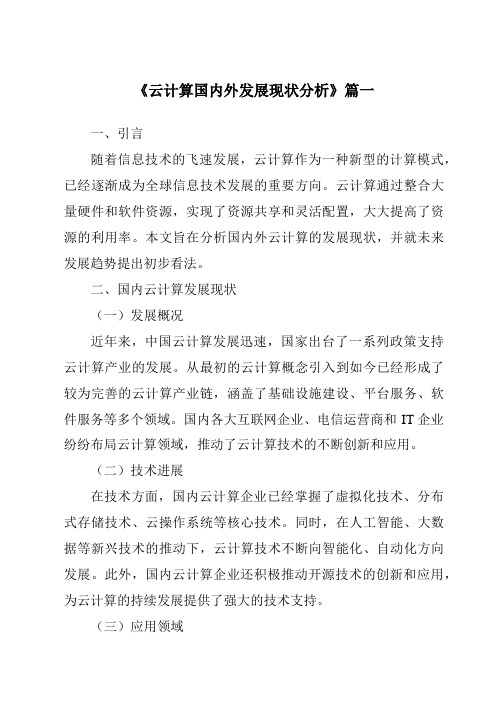
《云计算国内外发展现状分析》篇一一、引言随着信息技术的飞速发展,云计算作为一种新型的计算模式,已经逐渐成为全球信息技术发展的重要方向。
云计算通过整合大量硬件和软件资源,实现了资源共享和灵活配置,大大提高了资源的利用率。
本文旨在分析国内外云计算的发展现状,并就未来发展趋势提出初步看法。
二、国内云计算发展现状(一)发展概况近年来,中国云计算发展迅速,国家出台了一系列政策支持云计算产业的发展。
从最初的云计算概念引入到如今已经形成了较为完善的云计算产业链,涵盖了基础设施建设、平台服务、软件服务等多个领域。
国内各大互联网企业、电信运营商和IT企业纷纷布局云计算领域,推动了云计算技术的不断创新和应用。
(二)技术进展在技术方面,国内云计算企业已经掌握了虚拟化技术、分布式存储技术、云操作系统等核心技术。
同时,在人工智能、大数据等新兴技术的推动下,云计算技术不断向智能化、自动化方向发展。
此外,国内云计算企业还积极推动开源技术的创新和应用,为云计算的持续发展提供了强大的技术支持。
(三)应用领域在应用领域方面,国内云计算已经广泛应用于政府、金融、教育、医疗、制造等各个行业。
通过云计算技术,企业可以快速构建自己的信息化系统,提高业务处理效率和资源利用率。
同时,政府也积极推动云计算在公共服务领域的应用,如智慧城市、智慧交通等,为人们提供了更加便捷的服务。
三、国外云计算发展现状(一)发展概况国外云计算发展起步较早,技术成熟度较高。
美国、欧洲和日本等发达国家在云计算技术和应用方面一直处于领先地位。
这些国家积极推动云计算技术创新和产业发展,为企业和政府提供了强有力的技术支持。
(二)技术领先国外云计算企业在技术创新方面具有明显优势,尤其是在人工智能、物联网等领域取得了重要突破。
这些企业不仅掌握了先进的硬件和软件技术,还拥有丰富的应用场景和商业模式。
同时,国外企业还积极参与开源技术的创新和应用,为全球云计算的持续发展提供了强大的动力。
《2024年云计算研究现状综述》范文

《云计算研究现状综述》篇一一、引言云计算是近年来信息技术领域中迅速崛起的一项技术,以其强大的计算能力、灵活的扩展性以及高效率的资源利用,正逐渐改变着传统信息技术的运行模式。
本文旨在全面梳理云计算的研究现状,分析其发展历程、主要研究成果、应用领域及未来发展趋势,为相关研究者和从业者提供参考。
二、云计算的发展历程云计算的发展始于上世纪90年代,随着网络技术的不断进步,云计算的概念和技术架构逐渐形成。
经过多年的发展,云计算技术逐渐成熟,并在全球范围内得到广泛应用。
三、云计算的主要研究成果1. 云服务模式研究:研究云服务的不同模式,如基础设施即服务(IaaS)、平台即服务(PaaS)和软件即服务(SaaS),以及不同模式下的服务特点、适用场景和优化策略。
2. 云计算资源管理:研究云计算资源的管理和调度技术,包括虚拟化技术、资源分配策略、负载均衡等,以提高云计算资源的利用率和性能。
3. 云计算安全技术:研究云计算环境下的安全技术,如数据加密、访问控制、身份认证等,保障云计算环境的安全性。
4. 云计算平台架构:研究云计算平台的架构设计,包括云操作系统、云存储、云网络等关键技术,以实现高效、可靠、安全的云计算服务。
四、云计算的应用领域云计算技术已广泛应用于各个领域,包括但不限于:1. 电子商务:利用云计算的强大计算能力和扩展性,实现电商平台的快速部署和灵活扩展。
2. 大数据分析:利用云计算平台的高性能计算和大数据存储能力,实现大规模数据的分析和挖掘。
3. 人工智能:利用云计算资源为人工智能提供强大的计算支持,推动人工智能技术的发展。
4. 医疗健康:利用云计算技术实现医疗数据的共享和协同处理,提高医疗服务的质量和效率。
5. 政府和企业信息化:利用云计算实现政府和企业内部的信息资源共享和协同工作,提高工作效率和管理水平。
五、云计算的未来发展趋势1. 技术创新:随着技术的不断发展,云计算将进一步实现自主化、智能化和虚拟化,提高计算效率和资源利用率。
云计算研究现状综述
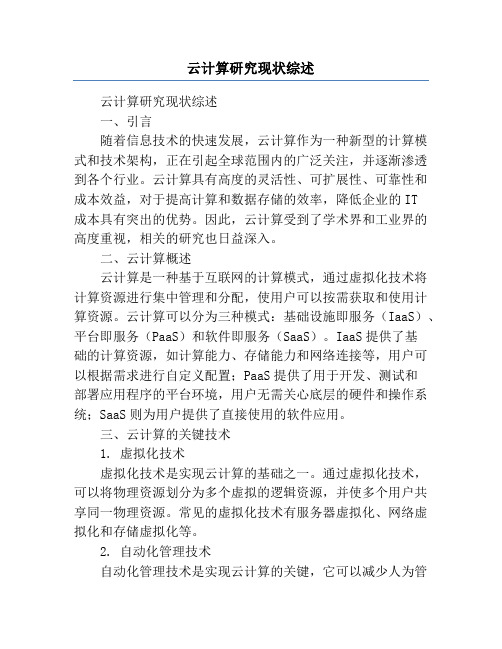
云计算研究现状综述云计算研究现状综述一、引言随着信息技术的快速发展,云计算作为一种新型的计算模式和技术架构,正在引起全球范围内的广泛关注,并逐渐渗透到各个行业。
云计算具有高度的灵活性、可扩展性、可靠性和成本效益,对于提高计算和数据存储的效率,降低企业的IT成本具有突出的优势。
因此,云计算受到了学术界和工业界的高度重视,相关的研究也日益深入。
二、云计算概述云计算是一种基于互联网的计算模式,通过虚拟化技术将计算资源进行集中管理和分配,使用户可以按需获取和使用计算资源。
云计算可以分为三种模式:基础设施即服务(IaaS)、平台即服务(PaaS)和软件即服务(SaaS)。
IaaS提供了基础的计算资源,如计算能力、存储能力和网络连接等,用户可以根据需求进行自定义配置;PaaS提供了用于开发、测试和部署应用程序的平台环境,用户无需关心底层的硬件和操作系统;SaaS则为用户提供了直接使用的软件应用。
三、云计算的关键技术1. 虚拟化技术虚拟化技术是实现云计算的基础之一。
通过虚拟化技术,可以将物理资源划分为多个虚拟的逻辑资源,并使多个用户共享同一物理资源。
常见的虚拟化技术有服务器虚拟化、网络虚拟化和存储虚拟化等。
2. 自动化管理技术自动化管理技术是实现云计算的关键,它可以减少人为管理的工作量,提高系统的可管理性和可靠性。
自动化管理技术包括自动部署、自动配置、资源调度和故障恢复等。
3. 大数据技术云计算环境下产生的数据量庞大,对存储和处理能力提出了很高的要求。
大数据技术可以对海量数据进行分析、挖掘和处理,从中挖掘出有价值的信息。
4. 安全与隐私保护技术云计算环境中存在着安全性和隐私保护的风险,因此,安全与隐私保护技术成为了云计算研究的重要方向。
包括数据加密、访问控制和身份认证等技术。
四、云计算的应用领域云计算作为一种新兴的计算模式和技术架构,正在广泛应用于各个行业。
1. 企业应用领域云计算对于企业来说,具有显著的经济效益和灵活性,可以大大降低企业的IT成本,提高企业的竞争力。
云计算外文文献+翻译

云计算外文文献+翻译1. 引言云计算是一种基于互联网的计算方式,它通过共享的计算资源提供各种服务。
随着云计算的普及和应用,许多研究者对该领域进行了深入的研究。
本文将介绍一篇外文文献,探讨云计算的相关内容,并提供相应的翻译。
2. 外文文献概述作者:Antonio Fernández Anta, Chryssis Georgiou, Evangelos Kranakis出版年份:2019年该外文文献主要综述了云计算的发展和应用。
文中介绍了云计算的基本概念,包括云计算的特点、架构、服务模型以及云计算的挑战和前景。
3. 研究内容该研究综述了云计算技术的基本概念和相关技术。
文中首先介绍了云计算的定义和其与传统计算的比较,深入探讨了云计算的优势和不足之处。
随后,文中介绍了云计算的架构,包括云服务提供商、云服务消费者和云服务的基本组件。
在架构介绍之后,文中提供了云计算的三种服务模型:基础设施即服务(IaaS)、平台即服务(PaaS)和软件即服务(SaaS)。
每种服务模型都从定义、特点和应用案例方面进行了介绍,并为读者提供了更深入的了解。
此外,文中还讨论了云计算的挑战,包括安全性、隐私保护、性能和可靠性等方面的问题。
同时,文中也探讨了云计算的前景和未来发展方向。
4. 文献翻译《云计算:一项调查》是一篇全面介绍云计算的文献。
它详细解释了云计算的定义、架构和服务模型,并探讨了其优势、不足和挑战。
此外,该文献还对云计算的未来发展进行了预测。
对于研究云计算和相关领域的读者来说,该文献提供了一个很好的参考资源。
它可以帮助读者了解云计算的基本概念、架构和服务模型,也可以引导读者思考云计算面临的挑战和应对方法。
5. 结论。
《2024年云计算研究现状综述》范文

《云计算研究现状综述》篇一一、引言云计算是近年来信息技术领域最为热门的话题之一,其通过虚拟化技术将计算资源以服务的形式提供给用户,使得用户可以按需使用、按量付费,从而极大地提高了资源的利用效率和灵活性。
随着云计算技术的不断发展和应用,越来越多的研究者开始关注其相关技术及应用的各个方面。
本文将对云计算研究的现状进行综述,为读者呈现一个全面的视角。
二、云计算研究背景与定义云计算是基于互联网的新型计算方式,其定义多种多样,但基本原理是通过虚拟化技术将各种计算资源(如服务器、存储、数据库等)抽象化、池化,然后通过网络对外提供服务。
这种模式为全球的用户提供了便利的IT服务方式,使其不再需要购买和配置自己的硬件设备,只需要通过互联网就能使用各种计算资源。
三、云计算研究现状(一)研究领域概述云计算的研究领域广泛,包括云计算平台、云计算安全、云计算服务、云计算应用等方面。
目前,国内外的研究者主要从这些方面对云计算进行研究。
(二)云计算平台研究云计算平台是云计算服务的基础,其性能和稳定性直接影响到云服务的可用性和用户体验。
目前,研究者主要关注云计算平台的架构设计、资源调度、虚拟化技术等方面。
同时,容器技术、微服务等新兴技术的出现也为云计算平台的研究提供了新的方向。
(三)云计算安全研究随着云计算的广泛应用,安全问题日益突出。
研究者主要关注云计算的安全架构、数据保护、访问控制等方面。
同时,随着人工智能和机器学习等技术的发展,这些技术也被广泛应用于云计算安全领域。
(四)云计算服务与应用研究云计算服务与应用是云计算落地的关键环节。
目前,研究者主要关注如何根据用户需求提供高质量的云服务,如云存储服务、云数据库服务、云应用开发平台等。
同时,随着物联网、大数据等新兴技术的发展,云计算在各行业的应用也日益广泛。
四、研究成果与进展近年来,云计算的研究取得了显著的成果和进展。
一方面,云计算技术不断完善和优化,使得云服务的可用性、可靠性和性能得到了极大的提高;另一方面,越来越多的企业和机构开始将业务迁移到云端,使得云计算的应用领域不断拓展。
《2024年云计算国内外发展现状分析》范文

《云计算国内外发展现状分析》篇一一、引言随着信息技术的飞速发展,云计算已成为全球信息技术领域的重要方向。
它以其灵活、可扩展、高效率的特性,在全球范围内得到了广泛的关注和应用。
本文将就云计算的国内外发展现状进行深入分析,旨在为相关研究和实践提供有价值的参考。
二、国外云计算发展现状1. 技术应用领域广泛国外的云计算技术在众多领域得到广泛应用,如互联网、医疗、金融、制造等。
云计算通过其高效的数据处理和存储能力,为各行业提供了强大的技术支持。
同时,随着人工智能、大数据等新兴技术的融合发展,云计算在数据处理和算法优化方面展现出巨大的潜力。
2. 产业生态日益完善国外云计算产业生态日益完善,形成了以云服务提供商、云平台开发商、云应用服务商等为主体的产业链。
同时,政府在政策上给予了大力支持,如提供税收优惠、资金扶持等,进一步促进了云计算产业的快速发展。
3. 创新驱动发展国外云计算企业在技术创新方面投入巨大,不断推出新的技术和产品。
例如,通过边缘计算、微服务等技术手段,提高云计算的效率和可靠性。
此外,随着5G等新一代通信技术的普及,云计算将进一步推动数字化转型和创新发展。
三、国内云计算发展现状1. 市场规模迅速增长近年来,我国云计算市场规模迅速增长,成为全球最大的云计算市场之一。
在政策支持和企业需求的共同推动下,国内云计算企业在技术和服务方面取得了显著进步。
2. 产业链日趋成熟我国云计算产业链日趋成熟,涵盖了云基础设施、云服务、云应用等多个环节。
同时,国内企业在云计算技术、应用场景和商业模式等方面不断创新,推动产业持续发展。
3. 政府和企业推动发展政府在推动云计算产业发展方面发挥了重要作用。
通过制定相关政策、投入资金支持等方式,促进云计算企业的技术创新和产业升级。
同时,国内众多企业也开始积极布局云计算领域,推动了产业的快速发展。
四、国内外发展对比分析1. 技术水平差距逐渐缩小尽管国外在云计算领域具有先发优势,但近年来我国在技术创新和产品研发方面取得了显著进步,技术水平与国外的差距逐渐缩小。
新技术云计算外文文献
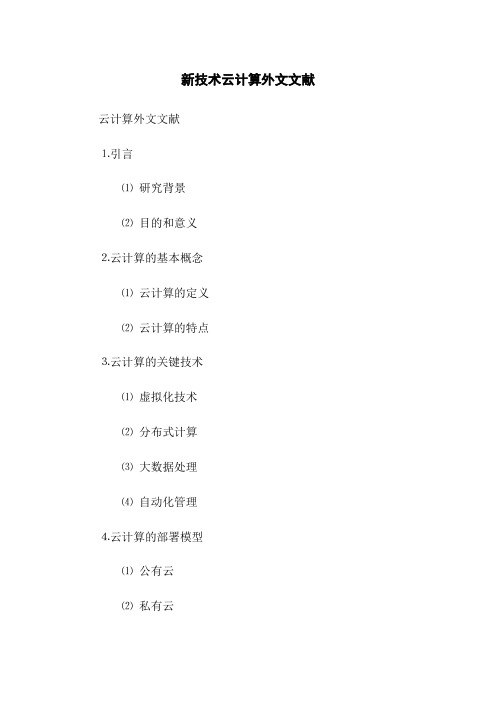
新技术云计算外文文献云计算外文文献⒈引言⑴研究背景⑵目的和意义⒉云计算的基本概念⑴云计算的定义⑵云计算的特点⒊云计算的关键技术⑴虚拟化技术⑵分布式计算⑶大数据处理⑷自动化管理⒋云计算的部署模型⑴公有云⑵私有云⑶混合云⑷社区云⒌云计算的服务模型⑴基础设施即服务 (IaaS)⑵平台即服务 (PaaS)⑶软件即服务 (SaaS)⒍云计算的安全问题⑴数据隐私⑵身份认证⑶访问控制⑷数据备份与恢复⒎云计算在行业中的应用⑴云计算在教育领域中的应用⑵云计算在医疗领域中的应用⑶云计算在金融领域中的应用⑷云计算在制造业中的应用⒏云计算的挑战与发展趋势⑴数据安全和隐私保护⑵法律法规的不完善⑶技术标准的制定和认证⑷云计算的发展趋势⒐结论⑴结论总结⑵研究展望附件:本文所涉及的附件包括相关统计数据和图表。
法律名词及注释:- 数据隐私:指个人或组织在使用云计算服务时,其数据不被未经授权的第三方获取或使用的权利。
- 身份认证:指在云计算环境中确认用户身份的过程,以确保用户访问的合法性和安全性。
- 访问控制:指对云计算资源的访问进行授权和管理,以保护资源免受未经授权的访问。
- 数据备份与恢复:指将数据复制到其他物理位置,以防止数据丢失,并在需要时恢复数据的过程。
- 公有云:指由第三方服务提供商提供的基于互联网的计算资源和服务,供公众使用。
- 私有云:指由单个组织内部使用的云计算基础设施,旨在满足特定组织的需求。
- 混合云:指同时使用公有云和私有云的云计算部署模型,以满足不同需求。
- 社区云:指由特定用户群体使用的云计算资源和服务,通常由或行业组织提供。
《2024年云计算研究现状综述》范文
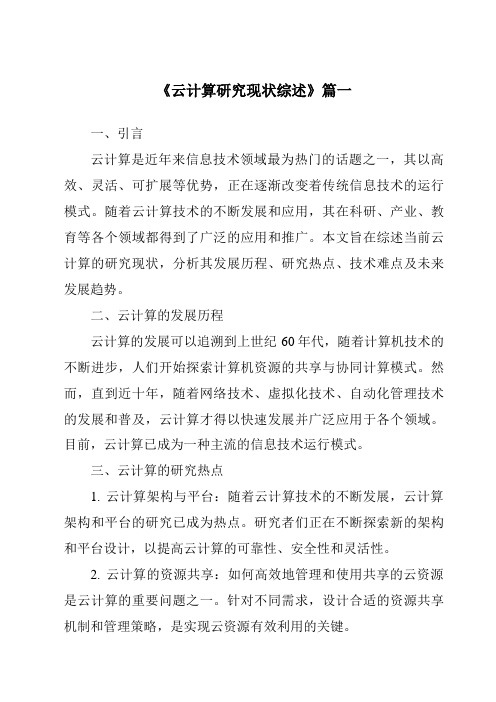
《云计算研究现状综述》篇一一、引言云计算是近年来信息技术领域最为热门的话题之一,其以高效、灵活、可扩展等优势,正在逐渐改变着传统信息技术的运行模式。
随着云计算技术的不断发展和应用,其在科研、产业、教育等各个领域都得到了广泛的应用和推广。
本文旨在综述当前云计算的研究现状,分析其发展历程、研究热点、技术难点及未来发展趋势。
二、云计算的发展历程云计算的发展可以追溯到上世纪60年代,随着计算机技术的不断进步,人们开始探索计算机资源的共享与协同计算模式。
然而,直到近十年,随着网络技术、虚拟化技术、自动化管理技术的发展和普及,云计算才得以快速发展并广泛应用于各个领域。
目前,云计算已成为一种主流的信息技术运行模式。
三、云计算的研究热点1. 云计算架构与平台:随着云计算技术的不断发展,云计算架构和平台的研究已成为热点。
研究者们正在不断探索新的架构和平台设计,以提高云计算的可靠性、安全性和灵活性。
2. 云计算的资源共享:如何高效地管理和使用共享的云资源是云计算的重要问题之一。
针对不同需求,设计合适的资源共享机制和管理策略,是实现云资源有效利用的关键。
3. 云服务:随着云计算服务类型的多样化,如何保证云服务的可靠性、可用性和服务质量是研究的热点问题之一。
研究重点在于云服务等级协议的设计与优化,以及服务质量监测和优化策略的研究。
四、云计算的技术难点1. 云安全问题:云计算面临着众多的安全问题,如数据安全、网络攻击等。
因此,如何在确保服务提供的前提下保护数据和信息安全成为亟待解决的技术难点。
2. 云计算的资源管理:云环境下资源数量巨大且种类繁多,如何对这些资源进行有效的管理以实现资源的高效利用也是技术难题之一。
3. 云计算的互操作性:由于不同云平台和不同云服务提供商之间存在差异,如何实现不同云平台之间的互操作性是一个需要解决的技术难题。
五、未来发展趋势1. 云计算将进一步向多租户、微服务、边缘计算等方向发展,以适应不同场景和需求。
《2024年云计算国内外发展现状分析》范文

《云计算国内外发展现状分析》篇一一、引言随着科技的快速发展和信息技术的深度应用,云计算逐渐成为当今科技界的核心力量。
从数据中心到终端用户,云计算服务无处不在,影响着社会的各个方面。
本文将深入分析国内外云计算的发展现状,通过综合分析对比,对全球云计算发展趋势做出准确的评估。
二、国内云计算发展现状1. 技术研发与自主创新中国云计算的研发与创新已取得了显著的成果。
中国云计算产业正依托强大的研发能力,通过持续的自主研发和创新,形成了包括基础设施、平台、应用服务在内的一系列完整的技术体系。
尤其是在超大规模计算能力、高性能计算和复杂数据处理的领域,中国云计算已具有全球竞争力。
2. 产业应用与发展中国的云计算已深入各行各业,覆盖了从互联网到工业、教育、医疗等多个领域。
其中,阿里云、腾讯云、华为云等企业在国际上的影响力和市场占有率逐步上升。
与此同时,大量的创新型企业和服务提供商不断涌现,推动了云计算产业的快速发展。
3. 政策支持与市场环境中国政府对云计算的发展给予了大力支持,出台了一系列政策措施,如《中国制造2025》、《新一代人工智能发展规划》等,为云计算的快速发展提供了良好的政策环境。
此外,中国的市场潜力巨大,对云计算的需求旺盛,这为中国的云计算产业提供了广阔的发展空间。
三、国外云计算发展现状1. 技术创新与引领美国的云计算技术在全球范围内具有明显的领先地位。
许多知名的科技公司如亚马逊、谷歌和微软等都在云计算领域投入了大量的研发资源,不断推动技术的创新与进步。
这些公司的云计算服务在全球范围内得到了广泛的应用和认可。
2. 产业生态与全球布局国外的云计算企业不仅在技术研发上有所突破,而且在全球产业布局和生态建设上也做得非常出色。
它们在全球范围内设立了众多的数据中心和研发中心,通过丰富的产品线和服务项目构建了完整的产业链生态,为用户提供全面的服务支持。
3. 法律政策与市场环境在法律政策方面,许多国家都为云计算的发展提供了良好的市场环境和政策支持。
云计算文献综述
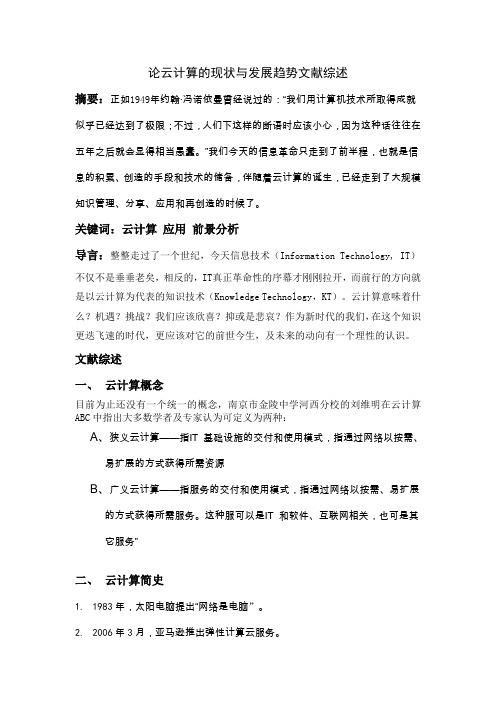
论云计算的现状与发展趋势文献综述摘要:正如1949年约翰·冯诺依曼曾经说过的:“我们用计算机技术所取得成就似乎已经达到了极限;不过,人们下这样的断语时应该小心,因为这种话往往在五年之后就会显得相当愚蠢。
”我们今天的信息革命只走到了前半程,也就是信息的积累、创造的手段和技术的储备,伴随着云计算的诞生,已经走到了大规模知识管理、分享、应用和再创造的时候了。
关键词:云计算应用前景分析导言:整整走过了一个世纪,今天信息技术(Information Technology, IT)不仅不是垂垂老矣,相反的,IT真正革命性的序幕才刚刚拉开,而前行的方向就是以云计算为代表的知识技术(Knowledge Technology,KT)。
云计算意味着什么?机遇?挑战?我们应该欣喜?抑或是悲哀?作为新时代的我们,在这个知识更迭飞速的时代,更应该对它的前世今生,及未来的动向有一个理性的认识。
文献综述一、云计算概念目前为止还没有一个统一的概念,南京市金陵中学河西分校的刘维明在云计算ABC中指出大多数学者及专家认为可定义为两种:A、狭义云计算——指IT 基础设施的交付和使用模式,指通过网络以按需、易扩展的方式获得所需资源B、广义云计算——指服务的交付和使用模式,指通过网络以按需、易扩展的方式获得所需服务。
这种服可以是IT 和软件、互联网相关,也可是其它服务”二、云计算简史1.1983年,太阳电脑提出“网络是电脑”。
2.2006年3月,亚马逊推出弹性计算云服务。
3.2006年8月9日,Google首席执行官埃里克·施密特在搜索引擎大会首次提出“云计算”概念。
4.2007年10月,Google与IBM开始在美国大学校园推广云计算的计划。
5.2008年1月30日,Google宣布在台湾启动“云计算学术计划”6.2008年7月29日,雅虎、惠普、和英特尔宣布一项涵盖美国、德国和新加坡的联合计划,推出云计算研究测试床,推进云计算。
《2024年云计算国内外发展现状分析》范文

《云计算国内外发展现状分析》篇一一、引言随着信息技术的飞速发展,云计算作为一种新型的计算模式,已经成为全球信息技术领域的重要发展方向。
本文旨在分析云计算在国内外的发展现状,探讨其发展趋势和挑战,以期为相关企业和研究机构提供参考。
二、国内云计算发展现状(一)发展历程自21世纪初云计算概念引入中国以来,经过近二十年的发展,我国云计算产业已经取得了显著成就。
从最初的探索阶段到现在的成熟应用阶段,云计算在政府、企业、科研等各个领域得到了广泛应用。
(二)技术进步随着国家对云计算产业的重视和支持,我国在云计算技术方面取得了重大突破。
例如,在虚拟化技术、分布式存储、大数据处理等方面,我国已经达到了国际先进水平。
同时,我国在云计算平台和云服务等方面也形成了自己的特色和优势。
(三)应用领域目前,云计算已经广泛应用于政府、企业、教育、医疗、金融等各个领域。
例如,政府通过云计算平台实现了政务服务的数字化和智能化;企业通过云计算实现了业务的快速扩展和灵活部署;教育、医疗、金融等行业也通过云计算提高了服务质量和效率。
三、国外云计算发展现状(一)发展历程相比国内,国外云计算发展历史更为悠久,技术相对成熟。
目前,美国、欧洲、日本等发达国家和地区的云计算产业已经进入了一个全新的发展阶段。
特别是在云计算技术和应用的创新方面,国外企业和研究机构发挥着重要作用。
(二)技术创新国外云计算产业在技术创新方面始终保持着领先地位。
例如,在人工智能、物联网、区块链等新兴技术领域,国外企业和研究机构积极探索与云计算的融合应用,推动了云计算产业的快速发展。
(三)市场应用国外云计算产业在市场应用方面也非常广泛。
从大型企业到中小企业,从政府机构到个人用户,都离不开云计算的支持。
同时,国外的云服务提供商在为用户提供更加安全、高效、便捷的云服务方面也不断进行创新和改进。
四、面临的挑战和趋势(一)挑战虽然云计算产业在国内外都取得了长足的进步,但仍面临诸多挑战。
《2024年云计算研究现状综述》范文

《云计算研究现状综述》篇一一、引言云计算是一种基于网络的、高度灵活可扩展的IT服务,可以快速、按需向用户提供所需的资源和服务。
在近年来,云计算技术的发展已成为全球关注的热点之一,并且它已被广泛用于许多行业领域。
为了深入了解云计算技术的发展情况及其在全球的普及程度,本文将综述云计算的研究现状。
二、云计算的定义与特点云计算是一种基于互联网的新型计算模式,它通过虚拟化技术将计算资源(如服务器、存储设备、数据库等)进行集中管理和动态分配,以实现资源的共享和按需使用。
其主要特点包括高可扩展性、灵活性、虚拟化、低成本和易管理等。
三、云计算研究的现状随着信息技术和互联网技术的不断发展,云计算研究在国内外均得到了广泛的关注。
国内外研究者们在云计算领域开展了大量的研究工作,涉及到云计算技术架构、安全、应用等方面。
1. 技术架构研究在技术架构方面,研究人员致力于构建更高效、可扩展和安全的云计算平台。
这些研究工作主要集中在云平台的架构设计、资源管理和调度等方面。
同时,为了满足不同应用场景的需求,研究者们还研究了多种云计算架构,如公有云、私有云和混合云等。
2. 安全性研究在安全性方面,由于云计算的开放性和共享性,其安全问题显得尤为重要。
研究人员在云计算的安全性和隐私保护方面进行了大量的研究工作,包括数据加密、访问控制、身份认证等。
此外,针对云计算的安全攻击和威胁,研究者们也提出了多种防御措施和安全策略。
3. 应用研究在应用方面,云计算已被广泛应用于各个领域,如企业级应用、移动计算、大数据处理等。
研究人员致力于将云计算技术应用于更广泛的领域,并探索其在不同领域的应用模式和优化方法。
例如,在大数据处理中,云计算可以提供强大的计算能力和存储能力,以支持大规模数据的处理和分析。
四、云计算研究的未来趋势随着云计算技术的不断发展和应用领域的不断拓展,未来的云计算研究将更加注重技术创新和应用创新。
一方面,研究人员将继续探索更高效、更安全的云计算技术架构和算法;另一方面,他们也将积极探索云计算在不同领域的应用模式和优化方法。
云计算文献综述

云计算文献综述
论云计算的现状与发展趋势文献综述
摘要:正如1949年约翰·冯诺依曼曾经说过的:“我们用计算机技术所取得成就似乎已经达到了极限;不过,人们下这样的断语时应该小心,因为这种话往往在五年之后就会显得相当愚蠢。
”我们今天的信息革命只走到了前半程,也就是信息的积累、创造的手段和技术的储备,伴随着云计算的诞生,已经走到了大规模知识管理、分享、应用和再创造的时候了。
关键词:云计算应用前景分析
导言:整整走过了一个世纪,今天信息技术(Information Technology, IT)不仅不是垂垂老矣,相反的,IT真正革命性的序幕才刚刚拉开,而前行的方向就是以云计算为代表的知识技术(Knowledge Technology,KT)。
云计算意味着什么?机遇?挑战?我们应该欣喜?抑或是悲哀?作为新时代的我们,在这个知识更迭飞速的时代,更应该对它的前世今生,及未来的动向有一个理性的认识。
文献综述
一、云计算概念
目前为止还没有一个统一的概念,南京市金陵中学河西分校的刘维明在云计算ABC中指出大多数学者及专家认为可定义为两种:
A、狭义云计算——指IT 基础设施的交付和使用模式,指通过网络以按
需、易扩展的方式获得所需资源
B、广义云计算——指服务的交付和使用模式,指通过网络以按需、易扩
展的方式获得所需服务。
这种服可以是IT 和软件、互联网相关,也可
是其它服务”
二、云计算简史
1.1983年,太阳电脑提出“网络是电脑”。
《2024年云计算研究现状综述》范文

《云计算研究现状综述》篇一一、引言云计算,作为一种新型的IT服务模式,近年来在全球范围内得到了广泛的关注和应用。
它通过虚拟化技术将计算资源(如服务器、存储设备、数据库等)以服务的形式提供给用户,使得用户可以按需使用、按量付费。
本文旨在全面综述云计算的研究现状,包括其发展历程、技术特点、应用领域以及当前研究热点和挑战。
二、云计算的发展历程云计算的发展始于20世纪60年代,经历了从分布式计算、网络计算到云计算的演变过程。
随着互联网技术的快速发展,云计算逐渐成为一种重要的IT服务模式。
目前,云计算已经广泛应用于各个领域,如企业级应用、政府公共服务、教育科研等。
三、云计算的技术特点云计算具有以下技术特点:1. 虚拟化技术:通过虚拟化技术,将物理资源(如服务器、存储设备等)抽象为虚拟资源,实现资源的动态分配和灵活调度。
2. 弹性伸缩:根据用户需求,云计算可以动态地增加或减少计算资源,实现资源的按需分配。
3. 高可用性:通过负载均衡和容错技术,云计算可以保证服务的可用性和稳定性。
4. 自服务化:用户可以通过互联网自助地获取和使用计算资源,无需与服务商进行复杂的沟通和协调。
四、云计算的应用领域云计算在各个领域都有广泛的应用,如企业级应用、政府公共服务、教育科研等。
在企业级应用中,云计算可以提供灵活的IT基础设施和高效的业务支持;在政府公共服务中,云计算可以提高政府服务的效率和透明度;在教育科研中,云计算可以提供强大的计算能力和数据存储能力,促进科研工作的开展。
五、当前研究热点和挑战1. 安全性与隐私保护:随着云计算的广泛应用,数据安全和隐私保护问题日益突出。
如何保障数据的安全性和隐私性是当前研究的热点之一。
2. 虚拟化技术优化:虚拟化技术是云计算的核心技术之一,如何优化虚拟化技术以提高资源利用率和性能是另一个研究热点。
3. 云服务创新:随着云计算的不断发展,如何创新云服务模式和提供更优质的云服务是当前研究的重点之一。
- 1、下载文档前请自行甄别文档内容的完整性,平台不提供额外的编辑、内容补充、找答案等附加服务。
- 2、"仅部分预览"的文档,不可在线预览部分如存在完整性等问题,可反馈申请退款(可完整预览的文档不适用该条件!)。
- 3、如文档侵犯您的权益,请联系客服反馈,我们会尽快为您处理(人工客服工作时间:9:00-18:30)。
本文档包括该专题的:外文文献、文献综述文献标题:An exploratory study on factors affecting the adoption of cloud computing by information professionals作者:Aharony, Noa期刊:The Electronic Library, 33(2), 308-328.年份:2015一、外文文献An exploratory study on factors affecting the adoption of cloud computing byinformation professionals(影响云计算采用与否的一个探索性研究)Aharony, NoaPurpose- The purpose of this study explores what factors may influence information professionals to adopt new technologies, such as cloud computing in their organizations. The objectives of this study are as follows: to what extent does the technology acceptance model (TAM) explain information professionals intentions towards cloud computing, and to what extent do personal characteristics, such as cognitive appraisal and openness to experience, explain information professionals intentions to use cloud computing.Design/methodology/approach- The research was conducted in Israel during the second semester of the 2013 academic year and encompassed two groups of information professionals: librarians and information specialists. Researchers used seven questionnaires to gather the following data: personal details, computer competence, attitudes to cloud computing, behavioral intention, openness to experience, cognitive appraisal and self-efficacy. Findings- The current study found that the behavioral intention to use cloud computing was impacted by several of the TAM variables, personal characteristics and computer competence.Originality/value- The study expands the scope of research about the TAM by applying it to information professionals and cloud computing and highlights the importance of individual traits, such as cognitive appraisal, personal innovativeness, openness to experience and computer competence when considering technology acceptance. Further, the current study proposes that if directors of information organizations assume that novel technologies may improve their organizations' functioning, they should be familiar with both the TAM and the issue of individual differences. These factors may help them choose the most appropriate workers.Keywords: Keywords Cloud computing, TAM, Cognitive appraisal, Information professionals, Openness to experienceIntroductionOne of the innovations that information technology (IT) has recently presented is thephenomenon of cloud computing. Cloud computing is the result of advancements in various technologies, including the Internet, hardware, systems management and distributed computing (Buyya et al. , 2011). Armbrust et al. (2009) suggested that cloud computing is a collection of applications using hardware and software systems to deliver services to end users via the Internet. Cloud computing offers a variety of services, such as storage and different modes of use (Leavitt, 2009). Cloud computing enables organizations to deliver support applications and avoid the need to develop their own IT systems (Feuerlicht et al. , 2010).Due to the growth of cloud computing use, the question arises as to what factors may influence information professionals to adopt new technologies, such as cloud computing, in their organizations. Assuming that using new technologies may improve the functioning of information organizations, this study seeks to explore if information professionals, who often work with technology and use it as an important vehicle in their workplace, are familiar with technological innovations and whether they are ready to use them in their workplaces. As the phenomenon of cloud computing is relatively new, there are not many surveys that focus on it and, furthermore, no one has so far focussed on the attitudes of information professionals towards cloud computing. The research may contribute to an understanding of the variables that influence attitudes towards cloud computing and may lead to further inquiry in this field.The current study uses the well-known technology acceptance model (TAM), a theory for explaining individuals' behaviours towards technology (Davis, 1989; Venkatesh, 2000), as well as personal characteristics, such as cognitive appraisal and openness to new experiences, as theoretical bases from which we can predict factors which may influence information professionals adopting cloud computing in their workplaces. The objectives of this study are to learn the following: the extent to which the TAM explains information professionals' attitudes towards cloud computing, and the extent to which personal characteristics, such as cognitive appraisal and openness to experiences, explain the intention of information professionals to use cloud computing.Theoretical backgroundCloud computingResearchers have divided cloud computing into three layers: Software as a Service (SaaS), Platform as a Service (PaaS) and Infrastructure as a Service (IaaS). SaaS has changed the concept of software as a product to that of a service instead. The software runs in the cloud and the user can access it via the Internet to work on an application. PaaS enables powerful tools for developers to create the applications, without having to deal with concerns about the infrastructure. IaaS provides complete infrastructure resources (e.g. servers, software, network equipment and storage). With IaaS, consumers do not have to purchase the latest technology, perform maintenance, upgrade software or buy software licenses (Anuar et al. , 2013). Cloud computing deployment can be divided into four types: private clouds, public clouds, community clouds and hybrid clouds (Mell and Grance, 2011). Public clouds have open access, private clouds run within organizations, community clouds containresources that are shared with others in the community and hybridclouds encompass two or more cloud models. Anuar et al. (2013) presented the main characteristics of cloud computing: flexible scale that enables flexible-scale capabilities for computing; virtualization that offers a new way of getting computing resources remotely, regardless of the location of the user or the resources; high trust , as the cloud offers more reliability to end users than relying on local resources; versatility , because cloud services can serve different sectors in various disciplines use the same cloud; and on demand service , as end users can tailor their service needs and pay accordingly.As cloud computing is relatively new, there are not a lot of surveys that focus on it. Several researchers conducted in-depth interviews investigating respondents' attitudes towards keeping their virtual possessions in the online world (Odom et al. , 2012). Teneyuca (2011) reported on a survey of cloud computing usage trends that included IT professionals as respondents. Results revealed preferences for virtualization and cloud computing technologies. However, the major reasons for cloud computing adoption being impeded were the lack of cloud computing training (43 per cent) and security concerns (36 per cent). Another report showed that nearly 40 per cent of Americans think that saving data to their hard drive is more secure than saving it to a cloud (Teneyuca, 2011). A further study (Ion et al., 2011) explored private users' privacy attitudes and beliefs about cloud computing in comparison with those in companies. Anuar et al. (2013) investigated cloud computing in an academic institution, claiming that cloud computing technology enhances performance within the academic institution. A study that was carried out in the education arena examined factors that led students to adopt cloud computing technology (Behrend et al. , 2010). Technology acceptance modelThe TAM (Davis, 1989) is a socio-technical model which aims to explain user acceptance of an information system. It is based on the theory of reasoned action (TRA) (Fishbein and Ajzen, 1975) which seeks to understand how people construct behaviours. The model suggests that technology acceptance can be explained according to the individual's beliefs, attitudes and intentions (Davis, 1989). The TAM hypothesizes that one's intention is the best predictor of usage behaviour and suggests that an individual's behavioural intention to use technology is determined by two beliefs: perceived usefulness (PU) and perceived ease of use (PEOU). PU refers to the individual's perception that using a technology will improve performance and PEOU addresses a user's perceptions that using a particular system would be free of effort (Davis, 1989). The current study concentrates on PEOU as the researchers wanted to examine if information professionals' perceptions about new technology is affected by its simplicity and friendly interface. Earlier research mainly investigated personal behaviour to use new information systems and technology in the following: corporate environments (Gefen and Straub, 1997);Web shopping (Chang et al. , 2002; Lin and Lu, 2000);education, particularly e-learning (Park, 2009) and m-learning (Aharony, 2014); and the library arena (Aharony, 2011; Park et al. , 2009).Personal innovativenessA construct which may contribute to information professionals' intention behaviour to use cloud computing is personal innovativeness, a major characteristic in innovation diffusion research in general (Agarwal and Prasad, 1998; Rogers, 1983, 1995). Agarwal and Prasad (1998) have coined the term "personal innovativeness in the domain of IT" (PIIT), which describes a quite stable characteristic of the individual across situational considerations. Previous studies found that personal innovativeness is a significant determinant of PEOU, as well as of PU (Agarwal and Karahanna, 2000; Lewis et al. , 2003). Several researchers have suggested that innovative people will search for intellectually or sensorially stimulating experiences (Uray and Dedeoglu, 1997).Openness to experienceAnother variable that may predict respondents' perspectives towards cloud computing is openness to experience which addresses the tendency to search for new and challenging experiences, to think creatively and to enjoy intellectual inquiries (McCrae and Sutin, 2009). People who are highly open to experience are perceived as also open to new challenges, thoughts and emotions (McCrae and Costa, 2003). Studies reported that there is a positive relation between openness to experience and intelligence tests (Gignac et al. , 2004). According to Weiss et al. (2012), challenging transitions may influence differently those who are high or low in openness to experience. Those who are high may approach these situations with curiosity, emphasizing the new possibilities offered to them. However, those who are low in openness may be threatened and try to avoid them by adhering to predictable environments. Various researchers note that people who are high in openness to experience are motivated to resolve new situations (McCrae, 1996; Sorrentino and Roney, 1999). Furthermore, openness to experience is associated with cognitive flexibility and open-mindedness (McCrae and Costa, 1997), and negatively associated with rigidity, uncertainty and inflexibility (Hodson and Sorrentino, 1999). Thus, people who are less open to experience tend to avoid novelty and prefer certainty. Studies reveal that openness to experience declines in the later years (Allemand et al. , 2007; Donnellan and Lucas, 2008).Challenge and threatThe following section will focus on the personality characteristics of challenge and threat that might affect information professionals' behavioural intention to use cloud computing. Challenge and threat are the main variables of a unidimensional, bipolar motivational state. They are the result of relative evaluations of situational demands and personal resources that are influenced both by cognitive and affective processes in motivated performance situations (Vick et al. , 2008). According to Lazarus and Folkman (1984), challenge refers to the potential for growth or gain and is characterized by excitement and eagerness, while threat addresses potential harm and is characterized by anxiety, fear and anger. Situations that suggest low demands and high resources are described as challenging, while those that suggest high demands and low resources are perceived as threatening (Seginer, 2008). In general, challenge or threat can take place in situations such as delivering a speech, taking a test, sports competitions or performing with another person on a cooperative or competitive task.The challenge appraisal suggests that with effort, the demands of the situation can be overcome (Lazarus et al. , 1980; Park and Folkman, 1997). On the other hand, threat appraisal indicates potential danger to one's well-being or self-esteem (Lazarus, 1991; Lazarus and Folkman, 1984), as well as low confidence in one's ability to cope with the threat (Bandura, 1997; Lazarus, 1991; Lazarus and Folkman, 1984). Different studies (Blascovich et al. , 2002; Blascovich and Mendes, 2000; Lazarus and Folkman, 1984; Lazarus et al. , 1980) have found that challenge leads to positive feelings associated with enjoyment, better performance, eagerness and anticipation of personal rewards or benefits. Several studies which focussed on the threat and challenge variable were carried out in the library and information science environment as well (Aharony, 2009, 2011).Self-efficacyAn additional variable which may influence individuals' behavioural intention to use cloud computing is self-efficacy. The concept of self-efficacy was developed in the discipline of "social learning theory" by Bandura (1997). Self-efficacy addresses individuals' beliefs that they possess the resources and skills needed to perform and succeed in a specific task. Therefore, individuals' previous performance and their perceptions of relevant resources available may influence self-efficacy beliefs (Bandura, 1997). Self-efficacy is not just an ability perception, it encompasses the motivation and effort required to complete the task and it helps determine which activities are required, the effort in pursuing these activities and persistence when facing obstacles (Bandura, 1986, 1997). The construct of self-efficacy is made up of four principal sources of information:"mastery experience" refers to previous experience, including success and failure; "vicarious experience" addresses observing the performances, successes and failures of others;"social persuasion" includes verbal persuasion from peers, colleagues and relatives; and"physiological and emotional states" from which people judge their strengths, capabilities and vulnerabilities (Bandura, 1986, 1994, 1995).As self-efficacy is based on self-perceptions regarding different behaviours, it is considered to be situation specific. In other words, a person may exhibit high levels of self-efficacy within one domain, while exhibiting low levels within another (Cassidy and Eachus, 2002). Thus, self-efficacy has generated research in various disciplines such as medicine, business, psychology and education (Kear, 2000; Lev, 1997; Schunk, 1985; Koul and Rubba, 1999). Computer self-efficacy is a sub-field of self-efficacy. It is defined as one's perceived ability to accomplish a task with the use of a computer (Compeau and Higgins, 1995). Various studies have noted that training and experience play important roles in computer self-efficacy (Compeau and Higgins, 1995; Kinzie et al. , 1994; Stone and Henry, 2003). Several studies have investigated the effect of computer self-efficacy on computer training performance (Compeau and Higgins, 1995) and on IT use (Easley et al. , 2003).HypothesesBased on the study objectives and assuming that PEOU, personal innovativeness,cognitive appraisal and openness to experience may predict information professionals' behavioural intention to use cloud computing, the underlying assumptions of this study are as follows:H1. High scores in respondent PEOU will be associated with high scores in their behavioural intention to use cloud computing.H2. High scores in respondents' personal innovativeness will be associated with high scores in their behavioural intention to use cloud computing.H3. Low scores in respondents' threat and high scores in respondents' challenge will be associated with high scores in their behavioural intention to use cloud computing. H4. High scores in respondents' self-efficacy will be associated with high scores in their behavioural intention to use cloud computing.H5. High scores in respondents' openness to experience will be associated with high scores in their behavioural intention to use cloud computing.H6. High scores in respondents' computer competence and in social media use will be associated with high scores in their behavioural intention to use cloud computing. MethodologyData collectionThe research was conducted in Israel during the second semester of the 2013 academic year and encompassed two groups of information professionals: librarians and information specialists. The researchers sent a message and a questionnaire to an Israeli library and information science discussion group named "safranym", which included school, public and academic librarians, and to an Israeli information specialist group named "I-fish", which consists of information specialists that work in different organizations. Researchers explained the study's purpose and asked their members to complete the questionnaire. These two discussion groups consist of about 700 members; 140 responses were received, giving a reply percentage of 20 per cent. Data analysisOf the participants, 25 (17.9 per cent) were male and 115 (82.1 per cent) were female. Their average age was 46.3 years.MeasuresThe current study is based on quantitative research. Researchers used seven questionnaires to gather the following data: personal details, computer competence, attitudes towards cloud computing, behavioural intention, openness to experience, cognitive appraisal and self-efficacy.The personal details questionnaire had two statements. The computer competence questionnaire consisted of two statements rated on a 5-point Likert scale (1 = strongest disagreement; 5 = strongest agreement). The cloud computing attitude questionnaire, based on Liuet al. (2010), was modified for this study and consisted of six statements rated on a seven-point Likert scale (1 = strongest disagreement; 7 = strongest agreement). A principal components factor analysis using Varimax rotation with Kaiser Normalization was conducted and explained 82.98 per cent of the variance. Principal components factor analysis revealed two distinct factors. The first related to information professionals' personal innovativeness (items 2, 3 and 5), and the second to information professionals' perceptions about cloud computing ease ofuse (PEOU) (items 1, 4, and 6); the values of Cronbach's Alpha were 0.89 and 0.88, respectively.The behavioural intention questionnaire, based on Liu et al. (2010), was modified for this study and consisted of three statements rated on a six-point Likert scale (1 = strongest disagreement; 6 = strongest agreement). Its Cronbach's Alpha was 0.79. The openness to experience questionnaire was derived from the Big Five questionnaire (John et al. , 1991) and consisted of eight statements rated on a five-point Likert scale (1 = strongest disagreement; 5 = strongest agreement); Cronbach's Alpha was 0.81. The cognitive appraisal questionnaire measured information professionals' feelings of threat versus challenge when confronted with new situations. It consisted of 10 statements rated on a six-point scale (1 = fully disagree; 6 = fully agree). This questionnaire was previously used (Aharony, 2009, 2011; Yekutiel, 1990) and consisted of two factors: threat (items 1, 2, 3, 5, 7 and 8) and challenge (items 4, 6, 9 and 10). Cronbach's Alpha was 0.70 for the threat factor and 0.89 for the challenge factor.The self-efficacy questionnaire was based on Askar and Umay's (2001) questionnaire and consisted of 18 statements rated on a five-point scale (1 = fully disagree; 5 = fully agree); Cronbach's Alpha was 0.96.FindingsTo examine the relationship between openness to experience, cognitive appraisal (threat, challenge and self-efficacy), TAM variables (personal innovativeness and PEOU), and behavioural intention to use cloud computing, researchers performed Pearson correlations, which are given in Table I.Table I presents significant correlations between research variables and the dependent variable (behavioural intention to use cloud computing). All correlations are positive, except the one between threat and behavioural intention to use cloud computing. Hence, the higher these measures, the greater the behavioural intention to use cloud computing. A significant negative correlation was found between threat and the dependent variable. Therefore, the more threatened respondents are, the lower is their behavioural intention to use cloud computing.Regarding the correlations between research variables, significant positive correlations were found between openness to experience and challenge, self-efficacy, personal innovativeness and PEOU. A significant negative correlation was found between openness to experience and threat. That is, the more open to experience respondents are, the more challenged they are, the higher is their self-efficacy, personal innovativeness, and PEOU and the less threatened they are. In addition, significant negative correlations were found between threat and self-efficacy, personal innovativeness and PEOU. We can conclude that the more threatened respondents are, the less they are self-efficient, personally innovative and the less they perceive cloud computing as easy to use. Significant positive correlations were also found between self-efficacy and personal innovativeness and PEOU. Thus, the more self-efficient respondents are, the more personally innovative they are and the more they perceive cloud computing as easy to use.The study also examined two variables associated with computer competence:computer use and social media use. Table II presents correlations between these two variables and the other research variables.Significant, high correlations were found between computer competence variables and openness to experience, self-efficacy, personal innovativeness, PEOU and behavioural intention to use cloud computing. Hence, the higher respondents' computer competence, the more they are open to experience, self-efficient and personally innovative, and perceive cloud computing as easy to use, the higher is their behavioural intention to use cloud computing.Researchers also examined relationships with demographic variables. To examine the relationship between age and other research variables, the researchers performed Pearson correlations. A significant negative correlation was found between age and PEOU, r = -0.21, p < 0.05. We may assume that the younger the respondents are, the more they perceive cloud computing as easy to use. To examine whether there are differences between males and females concerning the research variables, a MANOV A was performed and did not reveal a significant difference between the two groups concerning research variables, F (7,130) = 1.88, p > 0.05.The researchers also conducted a hierarchical regression using behavioural intention to use cloud computing as a dependent variable. The predictors were entered as five steps:respondents' openness to experience;respondents' computer competence (computer use and social media use);cognitive appraisal (threat, challenge and self-efficacy);TAM variables (personal innovativeness and PEOU); andinteractions with the TAM variables.The entrance of the four first steps was forced, while the interactions were done according to their contribution to the explained variance of behavioural intention to use cloud computing. The regression explained 54 per cent of behavioural intention to use cloud computing. Table III presents the standardized and unstandardized coefficients of the hierarchical regression of respondents' behavioural intention to use cloud computing.The first step introduced the openness variable that contributed significantly by adding 13 per cent to the explained variance of behavioural intention to use cloud computing. The beta coefficient of the openness variable is positive; hence, the more open to experience respondents are, the higher is their behavioural intention to use cloud computing. The second step introduced the two computer competence variables (computer use and social media use) which contributed 5 per cent to the explained variance of behavioural intention. Of these two variables, only the social media variable contributed significantly and its beta coefficient was positive. In other words, the more respondents use social media, the higher is their behavioural intention to use cloud computing. Note that Pearson correlations found significant positive correlations between these two variables and behavioural intention to use cloud computing. It seems that because of the correlation between these two variables, r = 0.33, p < 0.001, the computer use variable did not contribute to the regression.As the third step, researchers added respondents' personal appraisal variables (threat and challenge, and self-efficacy), and this also contributed significantly by adding 25 per cent to the explained variance of behavioural intention. The beta coefficients of challenge and of self-efficacy were positive, while that of threat was negative. Therefore, we may conclude that the more respondents perceived themselves as challenged and self-efficient, and the less they perceived themselves as threatened, the higher is their behavioural intention to use cloud computing. The inclusion of this step caused a decrease in the [beta] size of the openness to experience variable that changed it into an insignificant one, and may suggest a possibility of mediation. Sobel tests indicated that self-efficacy mediates between openness to experience and behavioural intention (z = 4.68, p < 0.001). Hence, the more respondents are open to experience, the higher is their self-efficacy and, as a result, the higher is their behavioural intention to use cloud computing.The fourth step added the TAM variables (respondents' PEOU and personal innovation), and this also contributed significantly by adding 9 per cent to the explained variance of behavioural intention to use cloud computing. The beta coefficient of this variable was positive; therefore, the more respondents perceived themselves to be personally innovative and cloud computing as easy to use, the higher is their behavioural intention to use cloud computing. Note that in this step there was a decrease in the [beta] size of self-efficacy. Sobel tests indicated that of the two variables, PEOU mediates between self-efficacy and behavioural intention (z = 4.77, p < 0.001). Thus, the more respondents perceive themselves as self-efficient, the higher they perceive cloud computing's PEOU and, as a result, the higher is their behavioural intention to use it.As the fifth step, researchers added the interaction between computer use X personal innovativeness. This interaction added 2 per cent to the explained variance of behavioural intention to use cloud computing and is presented in Figure 1.Figure 1 shows a correlation between personal innovation and behavioural intention to use cloud computing among respondents who are low and high in computer use. This correlation is higher among respondents who are low in computer use, [beta] = . 40, p < 0.05, than among those who are high in computer use, [beta] = 0.04, p < 0.05. It seems that especially among participants who are low in computer use, the higher their personal innovativeness, the higher is their behavioural intention to use cloud computing.DiscussionThe present research explored the extent to which the TAM and personal characteristics, such as threat and challenge, self-efficacy and openness to experience, explain information professionals' perspectives on cloud computing. Researchers divided the study hypotheses into three categories. The first (consisting of H1 -H2 ) refers to the TAM, the second (H3 -H5 ) to personality characteristics and, finally, H6 to computer competence. All hypotheses were accepted. Regarding the first category of hypotheses, results show that both were accepted. Findings suggest that high scores in PEOU and personal innovativeness are associated with high scores in respondents' intention to adopt cloud computing. These findings can be associated with previous。
